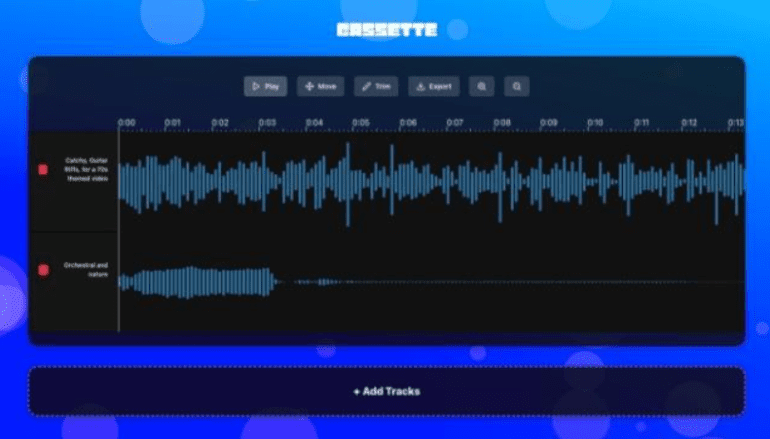TL;DR:
- Developers harness AI, like ChatGPT, to create text-to-music apps.
- PlayListAI’s Songburst and CassetteAI by Akhil Tolani lead the pack.
- Songburst crafts music from text prompts; CassetteAI generates up to 3-minute samples.
- Songburst subscription offers credits for mp3 track downloads; CassetteAI considers a pro tier.
- Industry giants Google and Meta also explore AI-driven music generation.
- OpenAI’s Jukebox model balances open-source access with usage restrictions.
Main AI News:
The ever-evolving landscape of technology has once again birthed novel applications that merge human creativity with the power of artificial intelligence. Enter the world of text-to-music apps, where the realms of language models and generative AI have united to orchestrate a symphony of possibilities. Leading this harmonious charge is Brett Bauman, the mastermind behind PlayListAI (formerly known as LinupSupply), who recently unveiled his latest creation, Songburst, on the App Store.
Songburst ushers in a new era of musical exploration, effortlessly bridging the gap between language and melody. Boasting an interface that’s both intuitive and accessible, the app invites users to conjure up their desired auditory experience with a few keystrokes. Whether seeking the tranquil cadence of calming piano melodies for a study session or the infectious rhythm of funky beats for a podcast introduction, Songburst delivers with finesse. Users simply input their prompts, and the app weaves those textual cues into a melodic tapestry.
If the wellspring of inspiration runs dry, Songburst comes to the rescue with an array of categorized prompts—video, lo-fi, podcast, gaming, meditation, and more—ensuring there’s no creative hurdle too tall to scale. Behind the scenes, the app’s backend is fortified by Vercel, while the melodies themselves emerge from the magic of Leap. As with any innovation in its early stages, Songburst does exhibit certain limitations, generating music clips of up to 30 seconds with variable quality. Nonetheless, Bauman affirms his commitment to refining the app, promising extended clip lengths and enhanced musical quality over time.
While the siren call of a free trial beckons, Songburst’s true potential is unlocked through its subscription model, priced at $9.99 per month or a discounted $79.99 per year. This premium tier rewards users with a generous allocation of 20 song credits each month, as well as the ability to download tracks in the ubiquitous mp3 format. For those seeking even more melodic prowess, supplementary credits are available in bundles of five ($7.99), ten ($11.99), or twenty ($15.99).
Bauman’s motivation for creating Songburst stemmed from a desire to offer a clean, mobile-native text-to-music solution, devoid of the intrusive tactics often associated with subscription-based services. However, he’s not alone on this creative journey. Akhil Tolani, the visionary behind the acclaimed music collaboration app Rapchat, has unveiled CassetteAI—an innovation available on both the web and the App Store.
CassetteAI embodies a similar ethos, enabling users to breathe life into their musical visions through the medium of text prompts. Yet, this offering stands apart with its capacity to conjure samples spanning up to three minutes. Tolani attributes this prowess to a proprietary model built upon the seq2seq hierarchical architecture—a structure expertly tailored for its specialized dataset, designed to yield copyright-free musical creations. Further empowering users, CassetteAI empowers experimentation by facilitating the creation of varied versions of generated tracks, fostering a space for rudimentary editing and mixing.
Despite the excitement surrounding these apps, it’s crucial to remember that they primarily cater to creators in search of copyright-free melodies for videos, podcasts, and more. Tolani himself acknowledges this target demographic, expressing a desire for AI to augment musical production without overshadowing the creative agency of human musicians. With a forthcoming Cassette AI pro subscription tier anticipated at $4.99 per month, Tolani strives to usher in a realm of unlimited song generation, bolstered by advanced AI models promising heightened quality.
In the grand tapestry of AI-powered music innovation, these developments are accompanied by the echoes of tech giants seeking their own harmonious contributions. Google’s MusicLM and Meta’s MusicGen have each staked their claim in this symphonic space, showcasing a burgeoning trend in the realm of AI-generated music. Despite the progress made in terms of audio quality, challenges remain. OpenAI’s Jukebox model, for instance, treads carefully with an open-source approach and usage restrictions to avoid legal complexities.
Conclusion:
The emergence of AI-driven text-to-music applications, exemplified by Songburst and CassetteAI, signifies a transformative shift in the music industry. These innovations demonstrate the fusion of technology and creativity, catering to creators seeking copyright-free musical content. As the market diversifies, the influence of AI in music creation is set to expand, with implications for both independent musicians and industry giants. The balance between accessibility, quality, and legal considerations will define the trajectory of this evolving landscape.

